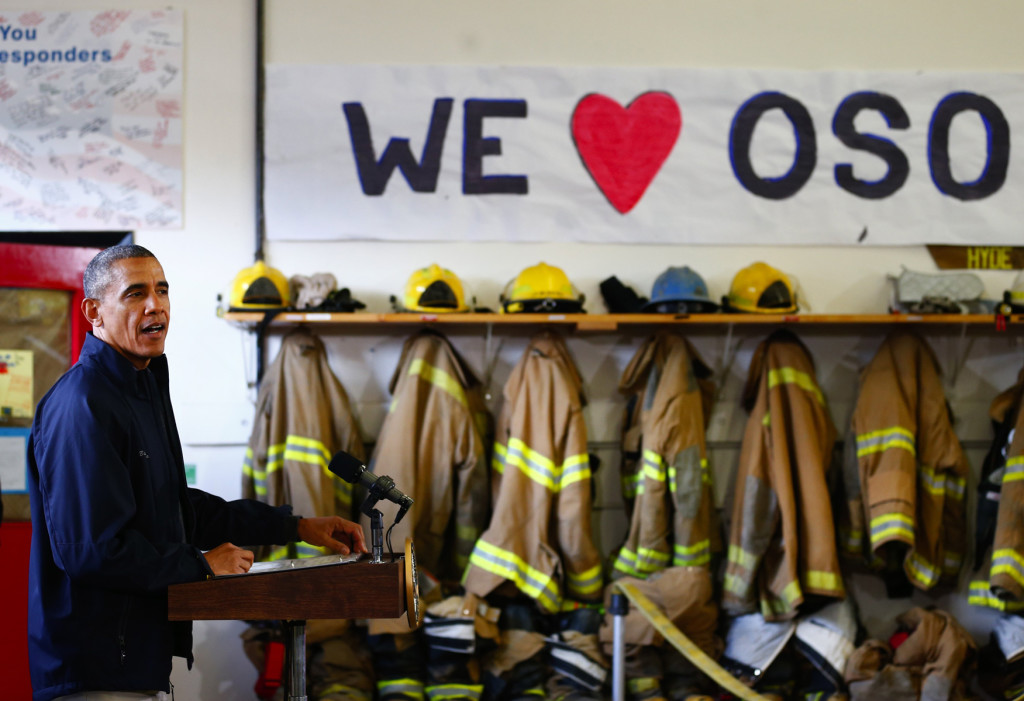“The country is thinking about all of you, and have been throughout this tragedy. We’re not going anywhere. We’ll be here as long as it takes.”
President Obama used these words to speak to the town of Oso, still reeling from last month’s devastating mudslides, on April 22.
Obama spoke to the resilience and strength of those still clearing the away the rubble that covers over one square mile of land along state route 530. He also announced that he has approved a major disaster declaration for the area, which will provide much-needed support for residents and businesses affected by the disaster. It will also provide financial support for the removal of debris and emergency measures like barricades.

President Barack Obama, left, makes his remarks inside the Oso Fire Department after surveying the damage and response efforts on Tuesday, April 22, 2014, in Oso, Wash, one month after a massive mudslide that killed 41 people. As of Tuesday, 41 victims have been identified, with the missing list narrowed down to just two. (AP Photo/The Seattle Times, Lindsey Wasson, Pool)
As of press time, the number of people known to have died in the mudslide has risen to 41. Two individual are still missing.
Early Monday morning, area authorities indicated that they would be scaling down their continuing search efforts for the final two individuals and shifting focus to debris removal, according to The Seattle Times.
According to Donald Jacks, the External Affairs Officer for the Federal Emergency Management Agency (FEMA), 900 people have registered for assistance from the organization, and over $300,000 has been distributed in housing and rental assistance for those affected.
Last Tuesday, FEMA also began offering commuter assistance grants for those whose 20 minute commutes between Darrington and Arlington have now been increased to hours because of detours around the site.
There are around 30 to 40 searchers looking for survivors in the area at any time. Emergency response specialist Marcus Deyerin said that working in the rubble is extremely difficult, both physically and emotionally. Rescuers have struggled to bring in the necessary heavy equipment because the soil is still wet and, in many places, has the same consistency as quicksand.
The mudslide’s cause has been linked to heavy rainfall in the area—among other things—and so the soil is heavily saturated with water. Every time it rains in the area, engineers have to work to pump the water out of the soil.
Moreover, much of the site is covered with toxic waste. Chemicals from households and other sites have mixed with human waste, resulting in areas of the slide that are dangerous for rescue workers. According to CNN, some workers have contracted dysentery.
In some areas, the wall of debris, mud, and wreckage is as deep as 70 feet.
Despite the difficulties, however, the town has seen a rush of support, both from the government and from surrounding states. The National Guard, first responders, and a number of other volunteers have all converged on the site to help.
Over 400 Red Cross volunteers have arrived on the site to provide support so far. The Red Cross has also opened two shelters in Arlington and Darrington to offer meals, health and psychological services to those affected by the mudslide.
FEMA currently has approximately 200 workers stationed in the area from all over the country.
Deyerin also pointed to the young people in the Washington Conservation Corp of AmeriCorps as the some of the many “unsung heroes” of those doing work in and around the site.
Candido Hernandez, an event promoter in Monroe who helps put on large events for the Hispanic community, put together a fundraiser with local musicians and raised over $5,000.
In Bothel, students at Canyone Park Junior High were inspired to help after watching a video about the slide. A group of students organized a week dedicated to fundraising, raising $790 and 200 letters of support written by students for the people of Oso.
To help with the huge amount of legal work, like sorting out wills and getting government assistance from FEMA, 200 lawyers have offered free legal services for anyone effected by the mudslide.
Deyerin said that efforts like these have had some of the most profound effects. At a recent community meeting last week, tables had laminated copies of letters that had been written to those still reeling from the disaster.
“The demonstration of charity has been really amazing,” Deyerin said. “It’s been really striking for people here to see the kind of support coming from all over the area.”
According to Deyerin, the best that the average person can do to help, besides keeping the town in their thoughts, is to support Darrington. The town, which relies mostly on tourism, is anxious about the future once the recovery period has transitioned to long-term community efforts.
“Darrington has a significant challenge ahead of them,” he said. “Visit that community. Support those businesses and the people who run them.”












